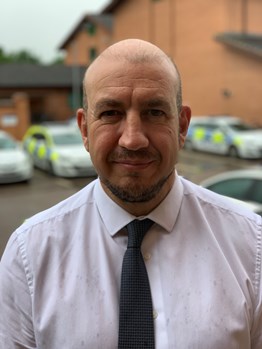New recruits hear first hand about mental health in policing from retired Leicestershire officer
3 October 2022

New recruits hear first hand about mental health in policing from retired Leicestershire officer
A police driver trainer who was one of the first officers on the scene at 2018’s Leicester helicopter crash has been giving presentations about mental health to new recruits.
Kev Marsh retired as a PC in January 2021 and is now a Leicestershire Police staff member. He believes that trainee officers need to know about the stresses and strains of policing, how to seek help, and the importance of having supportive supervisors, colleagues and family members.
Kev spent 13 years in roads policing, where he witnessed many traumatic incidents, but said the “tipping point” for him was the Leicester City FC disaster, where five people died when their helicopter crashed and burst into flames.
Kev said: “My background is in roads policing, and someone once asked me, how many dead people have you seen? I told them it was roughly 160 over my career. Sometimes there Would be Multiple fatalities at an incident.
“But the tipping point for me was the helicopter disaster and the things I saw on that day, how the people were trapped and we couldn’t help in the fire. And I thought, ‘Will we go up in the fire too?’
“The incident was in October but I didn’t really start to feel unwell until the May of the following year. My wife, who’s an ex-cop, knows me inside out, and she thought there was something wrong. She made a phone call to the Federation to say: ‘I’m a bit worried about Kev’, and they got me counselling and help through their Welfare Support Programme.
“I’m massively grateful to the Federation and the Welfare Support Programme. I found it so therapeutic to talk about what had happened.”
Kev realised that a lot of officers who were struggling with their mental health didn’t know what support was available, and that there was still a stigma about asking for help. So he approached the Chief Constable about giving a presentation to new Leicestershire Police recruits.
Kev said: “The presentation covers mental health issues but also what it’s like to have your annual leave cancelled, your days off cancelled, missing Christmas, missing birthdays. I ask people: ‘Who do you work with on your shift who you can talk to? Who’s looking after you?’”
He believes there should be more checks and balances in policing and that supervisors should be more proactive about keeping an eye on officers.
He said: “If an officer has been to a particularly horrific incident, it should be down to the supervisor to say: ‘I’m going to keep checking you’re alright – in a week, in a month, in three months, six months, and the anniversary of it happening.’ Also the supervisor should find out what support they have at home too.”



















